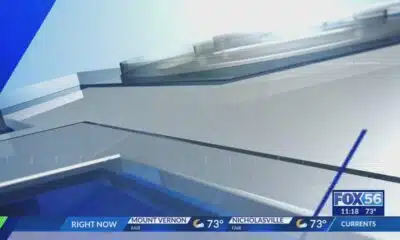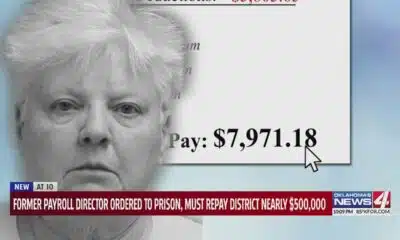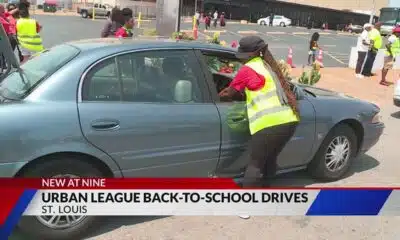News from the South - Georgia News Feed
GOP mega-bill stuck in US Senate as disputes grow over hospitals and more
by Ashley Murray, Shauneen Miranda, Jacob Fischler and Jennifer Shutt, Georgia Recorder
June 26, 2025
WASHINGTON — U.S. Senate Republicans appeared deeply divided Wednesday over how to establish a fund for rural hospitals to offset the budget impacts of Medicaid cuts in the “big, beautiful bill.”
The hospitals, which are generally already hurting financially, rely heavily on Medicaid, a state-federal partnership that provides health insurance for low-income households and for some people with disabilities.
GOP senators haven’t yet reached agreement on how to structure the fund, or on dozens of other unresolved provisions in the sweeping package, even though leaders hope to begin voting as soon as Friday. Still up in the air were agreements on major provisions of the measure involving the U.S. Department of Agriculture’s food aid program for low-income people and a proposed selloff of certain public lands.
Republican leaders continued to project optimism. “We’re well on our way to getting this bill passed this week,” Senate Majority Leader John Thune, R-S.D., said during a floor speech, continuing to press ahead toward a self-imposed Fourth of July deadline.
Others saw it differently. Wisconsin Republican Sen. Ron Johnson cast doubt on the short timeframe leaders have set to reach final agreement and move the bill through both chambers.
“We’re still discussing some pretty fundamental issues,” Johnson said. “I’m just laying out the reality of the situation. We’ve got a lot of work to do.”
‘The only person up here that’s ever ran a rural hospital’
Dueling plans to establish the rural hospital fund to ease the threat of Medicaid cuts circulated among senators working to finalize the massive tax and spending cut measure, but an agreement had not surfaced by late afternoon.
Unofficial details showed Senate Republicans eyeing the inclusion of a $15 billion fund — $3 billion a year between fiscal 2027 and fiscal 2031 — to help rural hospitals, according to multiple reports.
But Sen. Roger Marshall, who sits on the Senate Committee on Finance, said he wants to increase that fund to $5 billion annually, with “half of that going to rural hospitals, and half of it going to primary care and prescription drugs and throw in physical therapy and occupational therapy, all the others as well.”
The Kansas Republican and physician said “we should probably only do it for four or five years and then regroup and see where we are.”
“I’m the only person up here that’s ever ran a rural hospital — I actually know something about them,” he added.
While Marshall said he loves “90%” of the broader bill, he said not nearly enough is being cut.
“But I can’t get the votes to do that, so it’d still be the largest cut in spending in my lifetime anyway,” he said, noting that “it’s going to be hard for the House to vote against it.”
Fund size criticized
On a midday call with reporters, Traci Gleason with the Missouri Budget Project said the stabilization fund being batted around by lawmakers “would fall well short of addressing these problems.”
“Forty-three percent of Missouri’s rural hospitals are at risk of closing, and 17% are considered to be at immediate risk,” said Gleason, who spoke during a virtual press briefing organized by the left-leaning Center for Budget and Policy Priorities.
“Those figures don’t account for all of the other health care providers in rural communities, like federally qualified health centers and others that operate on these incredibly thin margins. So the massive cuts to Medicaid are what is creating the problem and the only real way to address it is for Congress to not make these massive cuts,” she said.
‘Problematic’ Medicaid cuts
Sen. Susan Collins was advocating for a much bigger rural hospital stabilization fund, at $100 billion.
“I don’t think that solves the entire problem,” the Maine Republican and chair of the Senate Appropriations Committee said.
“The Senate cuts in Medicaid are far deeper than the House cuts, and I think that’s problematic as well.”
Sen. Jim Justice of West Virginia said that the $15 billion “is better than zero.”
“You know, naturally, I’d want it to be as high as it possibly can,” he said, adding that rural hospitals are the “lifeblood” of his state.
Sen. Josh Hawley of Missouri, a loud voice against Medicaid benefit cuts, said a stabilization fund is a “good idea but we’re still going to have to address the longer term effects of this.”
When asked for a dollar figure, Hawley said “it depends on the structure of it.”
Texas Republican Sen. John Cornyn said he keeps hearing the Senate will take a procedural vote on Friday, though that isn’t set in stone.
“Should be a fun weekend for all of us,” Cornyn said. “Can’t wait.”
Once the Senate votes on what is called a motion to proceed, there’s a maximum of 20 hours of floor debate before the chamber must begin its marathon amendment voting session and eventually a passage vote.
SNAP provisions
Senate Agriculture Chairman John Boozman, an Arkansas Republican, said a revised version of his committee’s bill had not yet been reviewed by the parliamentarian.
The updated text alters a section restructuring the cost-share of the Supplemental Nutrition Assistance Program, or SNAP, a key food assistance program for low-income people.
The provision would require states for the first time to shoulder some of the cost of the program’s benefits. The amount a state owes would be determined by its error payment rate, with greater error rates requiring a higher state share.
Complex rules govern what can and can’t be included in the measure. The Senate parliamentarian ruled the language in the initial proposal did not comply with the chamber’s reconciliation rules.
The updated proposal would allow states more flexibility during the policy’s phase-in in fiscal 2028, allowing them to choose either the error rate in fiscal 2025 or fiscal 2026.
Boozman told reporters that change sought to respond to the parliamentarian’s ruling.
The parliamentarian “asked us to allow them (states) to use a different time frame — essentially gave them more time to understand what their error rate would be and to plan for it,” Boozman said. “And so we adjusted for that and I think we satisfied it.”
Lee and public lands
Senate Energy and Natural Resources Chairman Mike Lee of Utah reportedly narrowed a provision that would mandate the sale of Bureau of Land Management lands. He has not publicly said where it stands with the parliamentarian.
A committee spokesman did not return messages seeking clarification Tuesday and Wednesday, but a version of the changes obtained by news media shows changes consistent with what Lee proposed Monday.
Those changes include limiting the mandated sales to only the BLM — and not U.S. Forest Service lands, as Lee had initially proposed — and lowering the percentage of the agency’s lands that must be sold to between .25% and .5%. The initial proposal required between .5% and .75%.
The updated provision would also only require lands located within 5 miles of a population center to be sold and exempts lands that are currently used for grazing or another “valid existing right that is incompatible with the development of housing,” according to a copy of the changes obtained by hunting and angling publication Outdoor Life.
The provision has sparked opposition from Western lawmakers, including a handful of conservatives.
But it also has its share of supporters. Alaska Republican Dan Sullivan told reporters he had not seen the updated text but remained supportive of the idea.
“I’ve been supportive of what Sen. Lee is trying to do,” he said. “We have a lot of public lands in Alaska that the federal government abuses. But we’re in a good discussion on that, so I need to see the update.”
Georgia Recorder is part of States Newsroom, a nonprofit news network supported by grants and a coalition of donors as a 501c(3) public charity. Georgia Recorder maintains editorial independence. Contact Editor Jill Nolin for questions: info@georgiarecorder.com.
The post GOP mega-bill stuck in US Senate as disputes grow over hospitals and more appeared first on georgiarecorder.com
Note: The following A.I. based commentary is not part of the original article, reproduced above, but is offered in the hopes that it will promote greater media literacy and critical thinking, by making any potential bias more visible to the reader –Staff Editor.
Political Bias Rating: Center-Right
This article reports on a legislative debate primarily among Republican senators concerning funding for rural hospitals amid Medicaid cuts and other related budget measures. The language is factual and presents a range of Republican viewpoints, including support for spending cuts and concern about their impact. The inclusion of perspectives from both GOP leaders pushing the bill and critics within the party highlights internal divisions without overt editorializing. The presence of comments from a left-leaning budget analyst adds balance but does not shift the overall framing. The article maintains a mostly neutral tone with a slight center-right orientation due to its focus on Republican legislative priorities and fiscal restraint themes.
News from the South - Georgia News Feed
Patrick Joseph White: Who is the accused Emory and CDC shooter?
SUMMARY: Patrick Joseph White, 30, from Kennesaw, is identified as the shooter in a deadly incident near the CDC campus in DeKalb County, close to Emory University. The shooting occurred just before 5 p.m. Friday, damaging at least four CDC buildings with multiple bullet holes. White was found dead on the second floor of a nearby CVS, struck by gunfire; it is unclear if it was self-inflicted or by police. Neighbors said White lived with his parents and believed the COVID-19 vaccine caused illness. Officer David Rose, a new Dekalb County police recruit, was killed responding to the scene. The motive remains unknown.
The Georgia Bureau of Investigation has identified Patrick Joseph White as the active shooter in an incident near Emory University and the Centers for Disease Control and Prevention that left a DeKalb police officer dead. The GBI has not confirmed a motive for the shooting. However, one of White’s neighbors said that he was upset over the COVID-19 vaccine. Another neighbor said they would not have suspected White of doing something like this.
Subscribe to FOX 5 Atlanta!: https://bit.ly/3vpFpcm
Watch FOX 5 Atlanta Live: https://www.fox5atlanta.com/live
FOX 5 Atlanta delivers breaking news, live events, investigations, politics, entertainment, business news and local stories from metro Atlanta, north Georgia and across the nation.
Watch more from FOX 5 Atlanta on YouTube:
FOX 5 News: https://www.youtube.com/playlist?list=PLUgtVJuOxfqkmrF1fONNmi8nKI0Z-FPE-
FOX 5 Atlanta I-Team: https://www.youtube.com/playlist?list=PLUgtVJuOxfqlb_I16wBwizoAoUsfKEeWB
Good Day Atlanta: https://www.youtube.com/playlist?list=PLUgtVJuOxfqlKT5xsbsPFgr5EBzdsWTvG
FOX 5 Extras: https://www.youtube.com/playlist?list=PLUgtVJuOxfqli-5MS_2X-i6bNGWvV0RYP
You Decide: https://www.youtube.com/playlist?list=PLUgtVJuOxfqnCKb7UkRde2NXuaoPEAXut
Download the FOX 5 Atlanta app: https://www.fox5atlanta.com/app
Download the FOX 5 Storm Team app: https://www.fox5atlanta.com/storm
Follow FOX 5 Atlanta on Facebook: https://facebook.com/fox5atlanta
Follow FOX 5 Atlanta on Twitter: https://twitter.com/FOX5Atlanta
Follow FOX 5 Atlanta on Instagram: https://www.instagram.com/fox5atlanta/
Subscribe to the Morning Brief and other newsletters from FOX 5 Atlanta: https://www.fox5atlanta.com/email
News from the South - Georgia News Feed
CDC shooter believed COVID vaccine made him suicidal, his father tells police
SUMMARY: A Georgia man, Patrick Joseph White, opened fire on the CDC headquarters in Atlanta, wounding multiple buildings and fatally shooting DeKalb County Police Officer David Rose. White blamed COVID-19 vaccines for his depression and suicidal thoughts. The shooter was armed with five guns and was stopped by guards at the CDC before attacking a nearby pharmacy. White’s family cited his fixation on vaccines and recent personal distress. The attack deeply shook CDC staff, prompting lockdowns and security reviews. Health Secretary Robert F. Kennedy, Jr., an anti-vaccine advocate, expressed condolences but faced criticism, with some blaming his rhetoric for fueling hostility toward CDC employees.
The post CDC shooter believed COVID vaccine made him suicidal, his father tells police appeared first on www.wjbf.com
News from the South - Georgia News Feed
Shooter who attacked the CDC headquarters was a 30-year-old man from suburban Atlanta
SUMMARY: Patrick Joseph White, 30, from Kennesaw, Georgia, opened fire near the CDC headquarters in Atlanta, killing DeKalb County Police Officer David Rose and causing panic among CDC staff. White, armed with a long gun and three other firearms, fired from across the street after being denied campus entry. His father reported his son’s depression linked to his dog’s death and distrust of COVID-19 vaccines. The attack damaged multiple CDC buildings. Officer Rose, a former Marine, leaves behind a wife and three children. The shooting intensified tensions amid ongoing CDC funding cuts and political disputes, with some blaming anti-science rhetoric for fostering hostility toward public health workers.
The post Shooter who attacked the CDC headquarters was a 30-year-old man from suburban Atlanta appeared first on www.wsav.com
-
Mississippi Today6 days ago
After 30 years in prison, Mississippi woman dies from cancer she says was preventable
-
News from the South - Texas News Feed6 days ago
Texas redistricting: What to know about Dems’ quorum break
-
News from the South - Georgia News Feed7 days ago
Woman charged after boy in state’s custody dies in hot car
-
News from the South - North Carolina News Feed4 days ago
Two people unaccounted for in Spring Lake after flash flooding
-
News from the South - Florida News Feed6 days ago
Warning for social media shoppers after $22K RV scam
-
News from the South - Georgia News Feed6 days ago
Georgia lawmakers to return this winter to Capitol chambers refreshed with 19th Century details
-
News from the South - North Carolina News Feed7 days ago
Chapel Hill family starts nonprofit after twin daughters diagnosed with rare disease
-
News from the South - Louisiana News Feed6 days ago
Plans for Northside library up for first vote – The Current









































